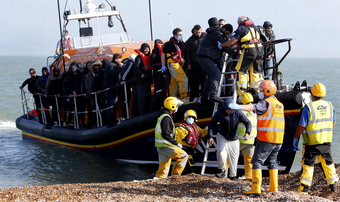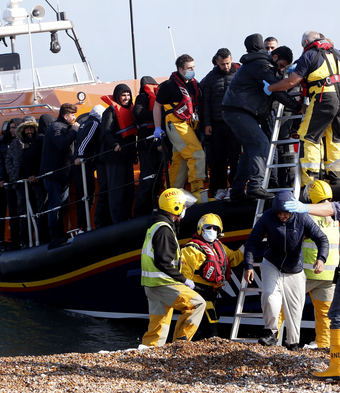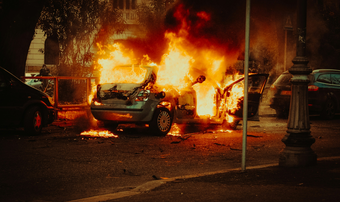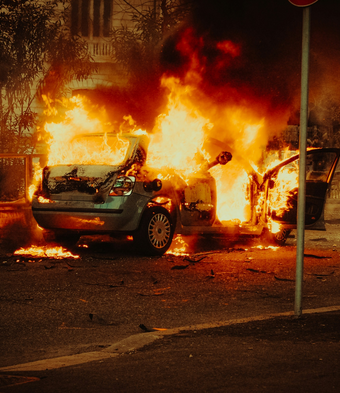Gaza Debate Debacle was the worst of our politics. But there's still hope
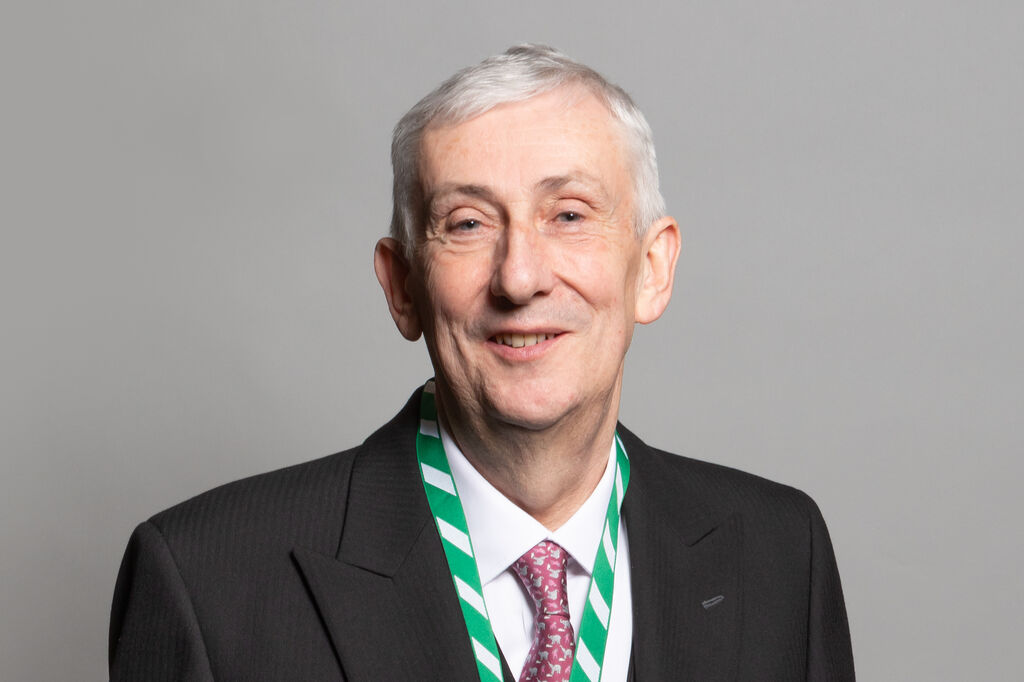
What happened in the House of Commons during the afternoon of 21 February has been met with understandable shock and disappointment. Even if you’re not interested in politics, you’ll have picked up that something went on. And I'm sure all of us are likely confused about what exactly happened! That’s before we get to asking how should we, as followers of Jesus, respond?
So, what did happen?
Wednesday 21 February was an opposition day. This is when an opposition party has the chance to table a motion for debate. Its purpose is to give space for a non-governing party to raise issues and put pressure on the government of the day. So, the Scottish National Party (SNP) decided to use their allotted time to hold a debate on a motion calling for an immediate ceasefire in Gaza.
The government and other parties have a range of options: accept the motion, vote against, or put down an amendment. In this instance the UK Government decided to table its own amendment calling for an immediate humanitarian pause.
Labour also tabled an amendment to the SNP motion, calling for a humanitarian ceasefire. This was politically sensitive for the Labour Leadership and especially Keir Starmer. Back in November last year, when a similar debate was held, 56 Labour MPs rebelled against Starmer’s authority by voting for a previous SNP amendments calling for a ceasefire. This included some shadow cabinet ministers who resigned. Understandably keen to keep his party together ahead of the upcoming election, the Labour amendment took a tougher line than previously, by calling for a ‘humanitarian ceasefire’, although this stopped short of going as far as the SNP’s position of an ‘immediate ceasefire’.
Now, here’s the crucial bit. The Speaker of the House of Commons, Sir Lindsay Hoyle, selects which amendments to the motion being debated will go to a vote. The historic convention is that the Speaker only selects the government amendment to the opposition party’s motion. Had Hoyle done this, it would have meant Labour MPs facing an unpalatable choice between abstaining, or supporting the government and it would have emboldened some, no doubt, to rebel again, just as 56 did last November.
But Hoyle chose to break this precedent by selecting both the Labour Party amendment and the Government’s amendment. To be clear: this wasn’t the Speaker re-writing the rules of parliament. Convention/precedent is different from rules and Hoyle was within his rights, technically, to act as he did. But it was highly unorthodox, reminiscent of the days of Brexit votes and parliamentary shenanigans. Hoyle's decision prompted the Clerk of the House to publish a letter explaining that the Speaker had ignored his advice not to act as he did.
Many MPs were furious - especially SNP MPs. The party's Westminster leader Stephen Flynn even led a walkout of the Party from the Commons, as did many Tory MPs left the Chamber as well. Amidst the chaos, the government actually withdrew its amendment and said it would take no further part in the debate. The end result was that Labour’s motion actually passed ‘on the nod’ without needing a vote.
Following the vote, an Early Day Motion has been tabled by Tory MP Will Wragg that says: ‘That this House has no Confidence in Mr Speaker’. At the time of writing, 69 MPs have added their names to it.
This is what happened on Wednesday. You can watch the full debate, if you so desire. A transcript is also available on Hansard.
So what should we make of it?
Firstly, the debate was bad for the Speaker. Sir Lindsay Hoyle is a respectable figure, liked by MPs all across the Commons. His actions yesterday have damaged his reputation and standing. It remains to be seen if he’ll survive. To his credit, he returned to the Commons and apologised, taking some responsibility for the chaos. In a society where there is little to no place for forgiveness, Christians can be distinct by accepting his apology and showing both grace and a willingness to forgive in response.
From a Christian perspective, a fair, impartial Speaker who is not dictated to by pressure groups matters. His role in mission critical in the success of parliament, which is the centre of democracy in our land. At CARE, we have always believed in good government, an institution ordained by God (Romans 13) and that this is most likely in the context of a healthy parliament. But if the Speaker of the House of Commons acts out of a place of fear and therefore ends up breaking conventions and precedents, as the Prime Minister warned, that is a slippery slope.
Secondly, the debate was bad for MPs. The issue being debated is of huge international importance. MPs should have been debating what is happening in the Middle East and Gaza in particular with a seriousness and a gravity that is consistent with the awful, tragic scale of human suffering that is taking place. It was unseemly that a debate on this issue became completely so by a Westminster meltdown over parliamentary process.
It’s not as if the Commons and MPs are not capable of such a debate. There are plenty of examples I could cite where MPs have held a debate on a serious issue with the appropriate decorum. Even last October, in the immediate aftermath of the Hamas terrorist attacks on Israel, the initial response from MPs was sober, serious and reflected the gravity of the situation. Another example from longer ago was a second reading debate on an assisted suicide bill in September 2015. Commentators still refer to it as a prime example of what is possible, MPs were debating a very serious issue and they did so with respect, use of argument, willingness to listen and to change their minds based on the arguments.
Political debate will always involve a degree of politicking. But it is the responsibility of MPs to not lose sight of the bigger picture. Israel is still suffering from the brutal terrorist attack in October last year. Hostages remain unreleased. In Gaza, close to 30,000 lives are thought to have been lost, including innocent children.
As followers of Jesus, we should care about suffering. Whatever our views on the conflict in the Middle East, we should lament the tragedy of war, suffering, death and ruin. We should pray for both justice and peace. Politics must serve the needs of people, made in God’s image (Genesis 1:26-28), rather than being about cheap political point scoring. At CARE, we’re for people before parties, politics and personalities. When the Commons should have been at its finest, it showed us its very worst. We should bemoan the fact that our politics is in such a state
Finally, the debate was bad for democracy. When he finally came back to the chamber, Hoyle explained that he chose all three options in part to allay MPs security fears. As one commentator pointed out in the aftermath, if we have reached a point where precedents are being broken because we are afraid for the safety of our MPs, something has gone badly wrong in our nation.
This surely demands a response. For months, protests have been allowed to take place that include incendiary and antisemitic chants like ‘from the river to the sea, Palestine must be free’. These very words were even projected on the side of Westminster yesterday. We need, it seems, to wake up to what is happening around us. One MP said on Thursday that if the debate on a ceasefire was re-run, the same thing would happen because too many colleagues are too afraid of what would happen to them if they failed to vote for a ceasefire.
Fear of violence and intimidation will lead to poor decision making. Such a reality weakens our democracy. In fact it is worth reflecting on words my colleague, Tom Kendall wrote recently for CARE: “declining trust in the democratic process, a willingness to use verbal abuse, and numerous MPs being subjected to death threats, violent attack, and attempted murder. This is the state of British democracy in 2024.”
In the Christian worldview, courage and conviction must be married to civility. Sadly both were regrettably absent from the debate yesterday. CARE has always sought to practice both. We call it grace and truth, based on John 1:14: “He came from the Father, full of grace and truth.” This convicted civility permits strong views, but guards against needless hurt. This is just such a time when this concept, rooted in the Christian worldview, needs to be revived and re-applied in public debate.
I worry that what happened in the Commons will intensify people’s disillusionment with politics. When you see MPs institutions failing in such a clear and obvious way, what hope is there for any lasting change? But we must not lose sight of the bigger picture and we must not leave God out of the equation. As followers of Jesus, we are optimistic, hopeful people! In the Bible, hope is both a comfort and a motivation. A comfort because it tells us that better days are coming. A motivation because what we do now for Jesus counts towards those better days.
And politics can be better. History has shown that the mother of all parliaments can rise to the occasion. There are laws now in place that have led to human flourishing and removed barriers. We must remember the doctrine of God's common grace (Matthew 5:45 says: "For he causes his sun to rise on the evil and the good, and sends rain on the righteous and the unrighteous." CSB). One of the consequences of common grace is that God can empower sinful human beings to reach heights of decency and compassion, even when they are still outside His saving love.
At CARE, our vision is to see politics renewed and lives transformed. At its best, politics helps save and improve lives. We are going through a dark season, when politics feels more and more fractured. But, as the saying goes, it is always darkest before the dawn. Further decline is not inevitable. Politics can be renewed.
For me, it’s a vision still worth pursuing.
Please note
A version of this article was first published by Premier Christianity and can be read on their website.
Please note: the image of Sir Lindsay Hoyle is from the UK Parliament website. It is his official House of Commons portrait. The image is used under the creative commons licence. It has not been altered or edited in any way. Original source is on the UK Parliament website.

